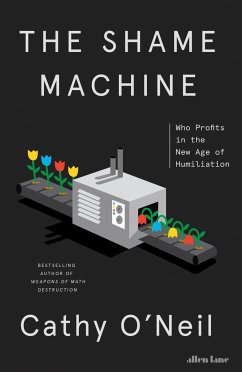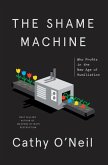A TIMES BOOK OF THE YEAR
Shame is being weaponized by governments and corporations to attack the most vulnerable. It's time to fight back
Shame is a powerful and sometimes useful tool. When we publicly shame corrupt politicians, abusive celebrities, or predatory corporations, we reinforce values of fairness and justice. But as best-selling author Cathy O'Neil argues in this revelatory book, shaming has taken a new and dangerous turn. It is increasingly being weaponized -- used as a way to shift responsibility for social problems from institutions to individuals. Shaming children for not being able to afford school lunches or adults for not being able to find work lets us off the hook as a society. After all, why pay higher taxes to fund programmes for people who are fundamentally unworthy?
O'Neil explores the machinery behind all this shame, showing how governments, corporations and the healthcare system capitalize on it. There are damning stories of rehab clinics, reentry programs, drug and diet companies, and social media platforms -- all of which profit from 'punching down' on the vulnerable. Woven throughout The Shame Machine is the story of O'Neil's own struggle with body image and her recent weight-loss surgery, which awakened her to the systematic shaming of fat people seeking medical care.
With clarity and nuance, O'Neil dissects the relationship between shame and power. Whom does the system serve? How do current incentive structures perpetuate the shaming cycle? And, most important, how can we all fight back?
Hinweis: Dieser Artikel kann nur an eine deutsche Lieferadresse ausgeliefert werden.
Shame is being weaponized by governments and corporations to attack the most vulnerable. It's time to fight back
Shame is a powerful and sometimes useful tool. When we publicly shame corrupt politicians, abusive celebrities, or predatory corporations, we reinforce values of fairness and justice. But as best-selling author Cathy O'Neil argues in this revelatory book, shaming has taken a new and dangerous turn. It is increasingly being weaponized -- used as a way to shift responsibility for social problems from institutions to individuals. Shaming children for not being able to afford school lunches or adults for not being able to find work lets us off the hook as a society. After all, why pay higher taxes to fund programmes for people who are fundamentally unworthy?
O'Neil explores the machinery behind all this shame, showing how governments, corporations and the healthcare system capitalize on it. There are damning stories of rehab clinics, reentry programs, drug and diet companies, and social media platforms -- all of which profit from 'punching down' on the vulnerable. Woven throughout The Shame Machine is the story of O'Neil's own struggle with body image and her recent weight-loss surgery, which awakened her to the systematic shaming of fat people seeking medical care.
With clarity and nuance, O'Neil dissects the relationship between shame and power. Whom does the system serve? How do current incentive structures perpetuate the shaming cycle? And, most important, how can we all fight back?
Hinweis: Dieser Artikel kann nur an eine deutsche Lieferadresse ausgeliefert werden.
An engaging read . . . O'Neil lays out the ways in which shame drives problems such as obesity, drug addiction, poverty and political divides. She discusses how social media thrives on and is designed to encourage humiliation, and unpicks the many fallacies in how we think about shame New Statesman









